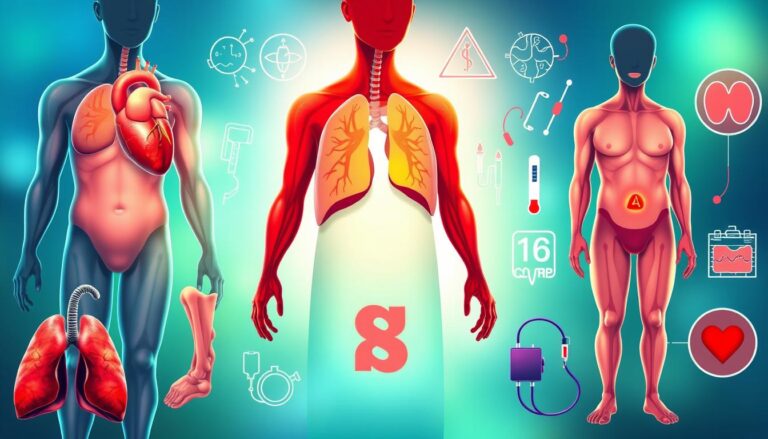Eggs are packed with nutrients, including 6–8 grams of protein and important vitamins like Vitamin D. But, there’s ongoing debate about eating eggs every day. This article looks into how daily egg eating fits with today’s nutrition and health goals.
Eating eggs daily isn’t just about cholesterol. One egg has 147 mg of choline, which is good for your brain. It also has carotenoids that protect your eyes. Studies now say that most people’s cholesterol isn’t greatly affected by eating eggs. This means you can safely eat up to 7 eggs a week, according to new health guidelines.
Key Takeaways
- Eggs supply 6–8g of high-quality protein per serving, supporting muscle and energy needs.
- Most individuals show minimal blood cholesterol changes from daily egg consumption, per recent studies.
- Harvard Health now permits up to 7 eggs weekly, reversing past restrictions.
- They provide choline, Vitamin D, and nutrients linked to eye health like lutein.
- Storage: Hard-boiled eggs stay fresh in the fridge up to one week, per USDA guidelines.
Eggs: A Nutritional Powerhouse in Your Daily Diet
Eggs are packed with nutrients that boost your health. A large egg has 70 calories, 6 grams of protein, and 5 grams of fat. They are a great source of balanced nutrition.
Their complete protein profile means they have all nine essential amino acids. This makes them a top choice for protein, scoring a perfect 100 on the biological value scale.
Complete Protein Profile of Eggs
Eggs are full of high-quality protein, which is key for muscle repair and growth. Their amino acids meet human needs, helping with tissue repair and immune function. Eating eggs daily may also raise HDL (“good”) cholesterol, improving metabolic health and keeping you full.
Essential Vitamins and Minerals in Eggs
- Vitamin B12 (9% of RDA) for nerve function and DNA synthesis
- Vitamin D (7% of RDA) for calcium absorption
- Selenium (22% of RDA) as an antioxidant cofactor
- Choline (113 mg per egg) for brain development and liver function
These nutrients work together to support energy, immunity, and cell health.
Caloric and Macronutrient Breakdown
A large egg has 70 calories, with 6g protein and 5g fat. Most of this fat is unsaturated, which is good for your heart. It also has 0.6g carbs. This mix helps keep you energized and supports muscle health without too many calories.
Studies show eating eggs can make you feel less hungry than eating carbs. This is because eggs have more protein and less carbs.
The Evolution of Egg Consumption Recommendations
Egg diet consequences have changed a lot over the years. At first, people were told not to eat eggs because of their cholesterol. But now, we know that dietary cholesterol doesn’t raise blood cholesterol for most people. This change shows how much we’ve learned about cholesterol and fats.

Older advice said to eat no more than 3-4 eggs a week. But today, the American Heart Association says it’s okay to have 1–2 eggs a day. The USDA also says eggs are good for a balanced diet. These updates mean we don’t worry as much about eggs being bad for us anymore.
| Aspect | Past Recommendations | Current Guidelines |
|---|---|---|
| Cholesterol Focus | Strict limits due to cholesterol content | Emphasis on overall diet quality |
| Frequency | ≤4 eggs weekly | 1–2 daily for healthy adults |
| Key Considerations | Cholesterol alone | Individual health status, saturated fat intake, and genetic factors |
Now, groups give different advice based on health. For example:
- Healthy adults: 1–2 eggs daily (American Heart Association)
- Individuals with cardiovascular disease: 3–4 weekly whole eggs
- Seniors with normal cholesterol: Up to 2 eggs daily
Today, we focus on eating well overall, not just avoiding certain foods. Eggs are okay for most people, but those with high cholesterol should be careful. Always talk to a doctor to make a diet plan that’s right for you.
What Happens If I Eat Eggs Every Day?
Looking into the health benefits of eating eggs daily means checking out both short and long-term effects. Studies show most healthy adults can safely eat up to seven eggs a week. This can help in many ways, like improving how our body uses energy and how we feel.
Immediate Effects on Energy and Satiety
- Eggs have a lot of protein (6g per egg) and healthy fats. This helps us feel full for 3-4 hours after eating.
- They keep our blood sugar levels steady. This is because eggs have almost no carbs (0g net carbs). This avoids the energy crashes that happen with sugary foods.
Week-by-Week Adaptations
| Timeline | Observed Changes |
|---|---|
| Week 1-2 | Improved energy stability and reduced midday snacking due to sustained amino acid absorption. |
| Week 3-4 | Metabolic markers like HDL (“good” cholesterol) may stabilize, while LDL changes vary by individual genetics. |
Long-term Health Outcomes
A 2023 study of 140 heart disease patients found no big increase in LDL (bad cholesterol) in those eating 12 eggs a week. For most adults, eating eggs daily can lead to:
“Eggs contribute 15% of the daily choline requirement, vital for nerve function and liver health.”
- Higher levels of vitamin D and B12, which boost our immune system and bone health.
- Long-term risks mainly show up in people with high cholesterol or diabetes.
It’s important to eat eggs in moderation. Eating too many eggs (more than 1-2 a day) can raise triglycerides in some people. It’s best to eat eggs with foods high in fiber, like whole grains. This helps get the most health benefits of eating eggs daily.
Heart Health: Debunking the Cholesterol Myths
Heart disease causes 19 million deaths each year worldwide. But, new studies show eggs might not be as bad as we thought. Most people don’t see a big change in their cholesterol levels from eating eggs every day.
How Dietary Cholesterol Affects Blood Cholesterol
The liver makes 80% of our cholesterol. It adjusts how much it makes when we eat more cholesterol. For 75% of people, eating eggs doesn’t change their blood cholesterol much.
Studies show eating an extra 100 mg of cholesterol (like in one egg) only raises total cholesterol by 2.2–2.5 mg/dl. LDL goes up by 1.9 mg/dl, but HDL goes up too, by 0.4 mg/dl. These small changes don’t usually cause heart problems for most people.
- Normal responders keep their blood cholesterol stable even with high-cholesterol diets
- Exercise can help even more: one study found lower triglycerides levels in active adults eating two eggs daily
Recent Research on Eggs and Cardiovascular Health
Meta-analyses with 260,000 participants found no heart disease risk for those eating eggs moderately. A Japanese study found a 30% lower stroke risk with daily egg intake. Even eating four eggs a day didn’t change lipid profiles in 12-week trials.
But, some groups might need to watch their egg intake:
- Diabetic individuals in some trials showed elevated risk
- Those with familial hypercholesterolemia or APOE4 genetic variants need to be careful
- Healthy adults eating up to seven eggs a week don’t face increased cardiovascular risk
Experts suggest keeping daily cholesterol under 300 mg. But, how we react to eggs can vary. Eggs can even help by boosting HDL and making LDL particles bigger. Always talk to a doctor about how many eggs are right for you.
Brain Function and Mental Health Benefits of Daily Egg Intake
Eggs are packed with nutrients that boost brain health. One large egg has 147 mg of choline. Choline is key for making neurotransmitters and keeping cell membranes strong. It also helps make acetylcholine, which is important for memory and learning.
Daily eggs also give you B vitamins like B12 and folate. These vitamins help keep your nerves healthy and prevent cognitive decline.
- Choline: Supports brain development and may reduce age-related cognitive decline.
- B12 and B6: Prevent homocysteine buildup, lowering Alzheimer’s risk.
- Lutein: Found in egg yolks, it accumulates in brain tissues to protect against oxidative stress.
| Nutrient | Per Large Egg (78 cal) |
|---|---|
| Choline | 147 mg |
| Vitamin B12 | 23% DV |
| Vitamin B5 | 14% DV |
| Selenium | 28% DV |
A 2021 study found that women who ate more eggs had slower cognitive decline. Those who ate eggs 5+ times a week showed better memory over four years. Choline is linked to better memory in older adults.
The USDA says eggs have 6g of protein and good fats. These support neurotransmitters like serotonin, which helps with mood.
Most people should eat eggs in moderation, as most guidelines suggest. Eating eggs with veggies boosts nutrient absorption. A balanced diet with varied foods ensures you get the most benefits from eggs without relying too much on them.
Muscle Development and Recovery: The Protein Advantage
Eggs are great for muscle growth and repair because of their amino acids. A large egg has 6 grams of protein. It also has all nine essential amino acids needed for muscle building.

Amino Acid Profile and Muscle Synthesis
Eggs have leucine, an amino acid that boosts muscle protein synthesis. One egg has 0.5 grams of leucine. This helps fix muscle tissue. The International Society of Sports Nutrition agrees:
“Whole food protein sources like eggs optimize recovery for active individuals.”
Timing Your Egg Consumption for Maximum Benefit
Eating eggs within 30 minutes after working out is best. Studies show eating 20-30 grams of protein after exercise helps a lot. A 2022 study found different protein needs for different ages:
| Age Group | Protein Requirement (g/kg/day) |
|---|---|
| Under 65 | 1.6 |
| 65+ | 1.2–1.59 |
Eggs for Athletes vs. Regular Consumers
Athletes need 1.6g protein per kilogram of body weight every day. Non-athletes might need 0.8g/kg. For example, a 70kg athlete needs 112g of protein daily, which is about 18 eggs. But, it’s better to mix eggs with other protein sources. Regular people can enjoy eggs for their fullness without eating too much.
Potential Risks of Consuming Eggs Every Day
Eggs are good for you, but some people might face health risks from eating them every day. They have a lot of cholesterol, about 186 mg in a large egg. This can be bad for your heart.
Studies show eating 1–3 eggs a day can raise your LDL cholesterol. This is a bad thing for your heart. A big study confirmed this link.
- Eating 300 mg of dietary cholesterol daily (like two eggs) can increase heart disease risk by 17% and death risk by 18%.
- A study with 27,000 people found daily egg eating raises heart disease risk by 6% and death risk by 8% over 17 years.
- People with type 2 diabetes or high cholesterol might be at even higher risk. One study found daily egg eaters had a 60% higher diabetes risk.
Genetics also play a role. Some people might be more affected by eggs because of their genes. Pregnant women should be careful because eggs might increase their risk of gestational diabetes.
New research shows a link between eggs and cancer. Eating an extra egg a day was linked to a 13% higher cancer death risk in a huge study. Men eating 2.5+ eggs a week had an 81% higher prostate cancer risk.
Some studies funded by the egg industry might not show the risks. But independent studies say to eat eggs in moderation. The American Heart Association suggests not eating more than 200 mg of cholesterol a day. That’s easily done with two eggs.
Before eating eggs every day, talk to your doctor. This is very important if you have heart or metabolic problems.
How Egg Preparation Methods Impact Health Outcomes
How you cook eggs can affect their safety, nutrients, and egg diet consequences. Different cooking methods change how well we digest them, how vitamins stay stable, and how much fat is added. This can change both the good and bad effects of eggs.

Raw vs. Cooked: Safety and Nutritional Differences
Raw eggs can have salmonella, leading to food poisoning. Cooking eggs makes proteins easier to digest. Studies show cooked eggs are 91% absorbed, while raw eggs are 51%.
Cooking also makes biotin more available. But, it can reduce the availability of some nutrients in raw eggs.
Boiled, Scrambled, or Fried: What Science Says
Boiling eggs best keeps vitamins, losing only 17-20% of vitamin A. Scrambling eggs might cut down on antioxidants by 6-18%. Frying eggs adds fats, like butter, which increases saturated fat intake.
Frying eggs at high heat can oxidize cholesterol. But, studies show it doesn’t directly cause heart disease in healthy adults. Baking eggs for over 40 minutes can reduce vitamin D by 61%, compared to frying’s 18% loss.
- Boiled eggs retain most nutrients, needing no added oil.
- Scrambled eggs cooked in olive oil preserve healthy fats better than butter.
- Frying increases calorie and saturated fat intake, depending on oil type.
Choosing the right way to cook eggs is key. Boiling or poaching eggs is best to keep nutrients and avoid egg diet consequences like too much saturated fat. Adjust your cooking methods to fit your health goals.
Egg Whites vs. Whole Eggs: Daily Consumption Comparison
Choosing between egg whites and whole eggs depends on your health goals. Egg whites are lean protein with few calories. Yolks, on the other hand, have more nutrients but higher cholesterol. Here’s how to decide what’s best for your diet.
- Egg whites offer 4g of protein per serving (from one large egg) with 0g fat and 0mg cholesterol.
- Whole eggs supply 6g protein but include 4.5g fat and 180mg cholesterol, plus vitamins A, D, B12, and choline.
- Yolks contribute 100% of an egg’s omega-3s (in fortified eggs) and antioxidants like lutein, which support eye health.
Egg White Consumption Effects benefit those managing cholesterol. Studies show egg whites may reduce saturated fat intake, making them ideal for heart health. For example, adults with cardiovascular risks might prioritize egg whites to minimize dietary cholesterol.
Egg yolk daily consumption offers nutrients like vitamin D and choline, critical for liver and brain function. Yet, individuals with genetic factors like the APoE4 gene or existing high cholesterol may see benefits from limiting yolks.
Who should choose egg whites? Those with cardiovascular concerns, high LDL cholesterol, or weight management goals. Research indicates egg white-only diets can align with protein needs without excess fats. For most healthy adults, consuming whole eggs 3–4 times weekly balances nutrition and risk.
Consult a healthcare provider before adjusting intake. Moderation remains key—evidence shows even at-risk groups can tolerate moderate yolk consumption when paired with heart-healthy diets low in processed fats.
Practical Guidelines for Healthy Daily Egg Consumption
Understanding the daily egg intake impact means finding the right balance. It’s about getting the most nutritional benefits while considering your health needs. Here are some steps to help you make the best choices for your diet:
“The American Heart Association recommends consuming one egg (or two egg whites) daily as part of a balanced diet.”

- Adjust portions based on health status: Healthy adults without heart problems can safely eat one whole egg a day. But, those with heart disease or high cholesterol should eat no more than 3–4 eggs a week.
- Choose cooking methods wisely: Boiling or steaming eggs is better than frying because it keeps more nutrients. Try to avoid adding too much butter or oil to keep saturated fat low.
- Pair eggs with nutrient-rich foods: Eat eggs with veggies, whole grains, or legumes for a well-rounded meal. You can also swap two egg whites for one whole egg to cut down on cholesterol.
- Ensure food safety: Always keep eggs in the fridge and don’t eat raw eggs to avoid getting sick. Make sure to check the expiration dates and wash your hands after touching eggs.
- Select quality eggs: Choose eggs that are enriched with omega-3 or come from pastured hens for extra health benefits. Always read the labels to compare what’s inside.
It’s also important to keep an eye on your cholesterol levels and talk to a doctor. Being mindful and moderate in your egg consumption is key to enjoying the daily egg intake impact on your health over time.
Conclusion: Balancing the Benefits and Considerations of Daily Egg Intake
Egg consumption affects people differently, but most can safely eat them every day. Eggs are a good source of protein and have nutrients like choline. They also have antioxidants like lutein, which are good for muscles, brain, and eyes.
Research shows that eating eggs daily is safe for most people’s hearts. This is because dietary cholesterol doesn’t raise blood cholesterol levels for many adults. Eggs might even help increase good cholesterol and make you feel full, which can help with weight.
But, there are some things to think about. Some people might see changes in bad cholesterol levels. Those with diabetes or certain genetic conditions should talk to their doctors. Cooking eggs at 160°F kills harmful bacteria like salmonella, making them safer to eat.
Eggs should fit into a healthy diet that includes lots of veggies, whole grains, and healthy fats. For most, adding eggs to your diet is good for you. But, it’s important to think about your own health and how eggs might affect you.
It’s all about finding the right balance. Eggs are part of a bigger picture for staying healthy. They should be part of a plan that includes exercise, eating well, and taking care of your mind.





